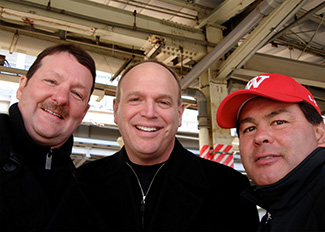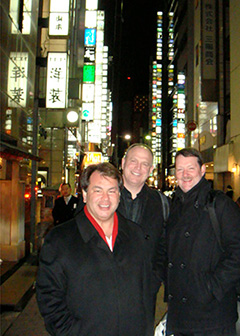Six years ago, John Hilbrich ’81 and his business partner, Mark Anthony, bought Brandimage, a global design and branding firm with nine offices in seven countries. As is the case in purchases of this nature, the firm had potential, but some shaky financials.
“Only after I got in there and realized how screwed up it was did the wheels start turning on what I needed to do to turn it around,” said Hilbrich.
Assessing what works and what doesn’t can be a daunting task. Trusting those closest can ease that burden. So Hilbrich turned to a pair of Wabash Sigma Chi brothers, Dan Doster ’81 and Fred Kendall ’81, to help bring stability.
Doster, a former McKinsey Consultant with a proven record of advising and leading businesses of all sizes, committed to the project. He commuted from Raleigh, NC, to Cincinnati for 22 months to handle chief financial officer and operations duties.
In the first six months many changes were made to the financial structure of the company, including closing down offices to gain solid footing.
 “When you go into a business that has 200 people and you don’t know any of them, you have to turn it around by figuring out who is good and who isn’t,” Hilbrich said. “The trust has to work all around. My relationship with Dan was of such value that it made sense to depend on him.”
“When you go into a business that has 200 people and you don’t know any of them, you have to turn it around by figuring out who is good and who isn’t,” Hilbrich said. “The trust has to work all around. My relationship with Dan was of such value that it made sense to depend on him.”
One of the key locations happened to be Tokyo, which had a good core of business, but was operating under a “big batch of debt,” according to Hilbrich. While he and Doster talked of how to best proceed with a troubled office half a world away, Kendall’s name came up.
Working in Asia for 25 years – mostly in advertising – Kendall was stateside in Northwest Indiana at the time in between opportunities. Hilbrich sensed that perhaps his stars were aligning and asked Kendall if he could go to Tokyo to give him a complete assessment of the situation.
He came back after three weeks with the good and the bad. In the end, he felt it had potential. Hilbrich and Kendall worked out the details on a napkin and a week later, Kendall was back on a plane to Tokyo to resurrect the office.
“Of the international locations, the Tokyo office was by far in the worst circumstances,” Kendall recalled. “The initial report was probably John’s slap-in-the-face moment. Perhaps to my detriment, I’m a bit too honest at times, but John and I have a relationship, and he could rely on my judgment.”
Kendall had the Tokyo office under control and Doster turned his attention to a myriad of legal, accounting, banking, resource, and real estate issues in the U.S., Europe, and other parts of Asia. Hilbrich was freed up to strategize and move forward more rapidly by focusing on leadership and growth.
“There is a good Harvard Business School case study that could be written about it.” Doster said. “The strength of the bond between us was the heart of what permitted the rapid growth to happen, and it was remarkable from a contextual perspective. There were no agendas between us. We could just get to the point.”
The turnaround was not all smooth sailing. In March 2011, the effort also had to withstand the magnitude-9 Tohoku earthquake and resulting tsunami that devastated Japan and stunted incoming cash flow for three months.
“We were 200 miles from the epicenter. I was sitting at my desk and it felt like an airplane in really bad turbulence,” said Kendall, now the managing director for RedWorks, Inc. “Usually an earthquake lasts, 15, 30, maybe 45 seconds. This one lasted nearly five minutes. It was beyond imagination. A once in a 1,500-year earthquake.”
Kendall tried to provide a balanced, proper response. Once it became clear the situation had become dire, Kendall shut down the office and instructed everyone to evacuate Tokyo. At that point, he pulled the hard drives from all of the office computers, stuffed them in a backpack and hastily arranged a flight to Honolulu for him, his wife, and his dog.
Weathering that storm proved to be a harbinger of good things to come as the business was sold to a Fortune 500 company in October 2011, of which Doster played a vital role in the negotiations. “It was John’s company to sell,” Doster said.” “He had to decide when the deal was what he wanted. For my part, it was amazing to serve him by getting to a great outcome.
“That the three of us got to work together every day and talk about business was as good as it gets,” continued Doster, who authored “Relationships Matter: A practical business guide” in 2014. “We had a great time and a chance to do a lot of interesting things together.”
Hilbrich, currently the CEO at sandbox Group LLC, feels fortunate to have been able to call on his Wabash pals when he needed them.
“It was incredibly gratifying to go through this very intense period of time, and I never had  more fun in my life than that harrowing two years when I was turning this thing around with my friends,” he said. “It was stressful, but it was a lot of fun. Those were relationship builders that you never have later in life. We all used the skill sets that we’d gained since leaving Wabash.”
more fun in my life than that harrowing two years when I was turning this thing around with my friends,” he said. “It was stressful, but it was a lot of fun. Those were relationship builders that you never have later in life. We all used the skill sets that we’d gained since leaving Wabash.”
Harrowing experiences aside, the fun wasn’t lost on Kendall either. “In hindsight, that was truly the win-win of it,” he said. “You don’t imagine you’ll be able to work closely with fraternity brothers. It was a lot of fun. If only work could be as much fun as going to college.”
What made this partnership work?
John Hilbrich: “Three things were required in the turnaround process, great relationships among the guys getting it done; the grit and the necessary gumption to will things over the transom when you are in a business that everybody thinks should be shut down; and the skill set required to get it done. Complete trust has to exist at the top. It’s paramount.”
Dan Doster: “We were opportunistic. It looked like it would be fun, so we said, ‘let’s do it.’ The basis for the lasting relationships between John, Fred and me began in college. Years later, we discovered trust is timeless. Wabash allowed us to quickly get to the point of something significant. Each of us had demonstrated business successes already. This was a moment in time where we could bridge those otherwise independent activities and make them into something of greater value. Our business successes while working together were built on the foundation of trust that was created 35 years ago at Wabash College.”
What does Wabash mean to you?
JH: “I don’t think you can go through the place and not know there is something special about it. Changing majors, having my world shifted, then going on and having another 30 years of staying connected and talking about it, to me, it’s deeper and more special than most places. It’s a deeper, more individual connection.”
Fred Kendall: “The type of environment Wabash creates affords you the opportunity to build unique bonds. We built some lasting friendships in that fraternity at Wabash. The personal relationships are the glue that holds it all together.”
How valuable are the liberal arts in business?
JH: “If you want to be at the top, you can’t be focused in one area of understanding. You have to be able to connect and understand everybody. That requires a wide and varied understanding of skills and leadership to go with it, particularly the understanding of one that is as hard core as Wabash. It took me a couple of years (of college) to figure out what I needed to do to be successful. It wasn’t just read and regurgitate; it was read, think, and understand it why it’s important. You can’t dissect a business problem, or a life problem for that matter, without having that skill. That was a big realization for me.”
FK: “It’s beyond business; it’s life. What I find maddening is the number of people who can’t critically think. Wabash taught us is how to think. It’s the best skill I got from Wabash.”
What’s the value in relationships for you?
DD: “When I was 18 or 28, I didn’t have the capacity to understand how important relationships really are. I speak of it often and in a very direct way. Don’t run past the relationship. That’s the main event. I still look in my children’s faces and I wonder if they understand the significance of what I’m talking about. I’m not sure they do. I don’t know if it’s even possible to see the significance of the thread that runs through life until you have some history to observe it.”
JH: “Dan and Fred are smart, successful dudes who know their (stuff). When you work with guys like that, you point them in the right direction and let them go. Dan always said, ‘I just want to make sure that you have complete access to what’s in my brain so that you can make the right call. I may not always agree, but I’m going to let you know what I think.’ I appreciated that. That’s why it worked so well.
What’s it like to work overseas?
FK: “One of the blessings of living overseas is life is never routine. You are learning something new every day. I like that challenge. I’ve got more than 25 years of experience, but I still enjoy the challenges. For me, working here sort of pulls together my entire resume, my education; it taps on various aspects of me down to my core DNA.”